Most discussions over the last two years about changing Blue Hill Avenue have focused from curb to curb on a city-led project to add center bus lanes, improve sidewalks, and alter parking patterns.
But many observers say that the corridor that runs from Mattapan Square to Grove Hall at the edge of Roxbury is already experiencing a transformation beyond the curbs, particularly in the blocks around the Morton Street intersection where Dorchester and Mattapan meet. This stretch of the avenue, they point out, has seen a burst of new investment in recent months, with more in the queue.
“I think in this particular area we have a lot of real estate owned by BIPOC folks and they never had the resources or knowledge to re-develop their storefronts or properties,” said Dariela Villon-Maga, a Mattapan-based real estate developer.
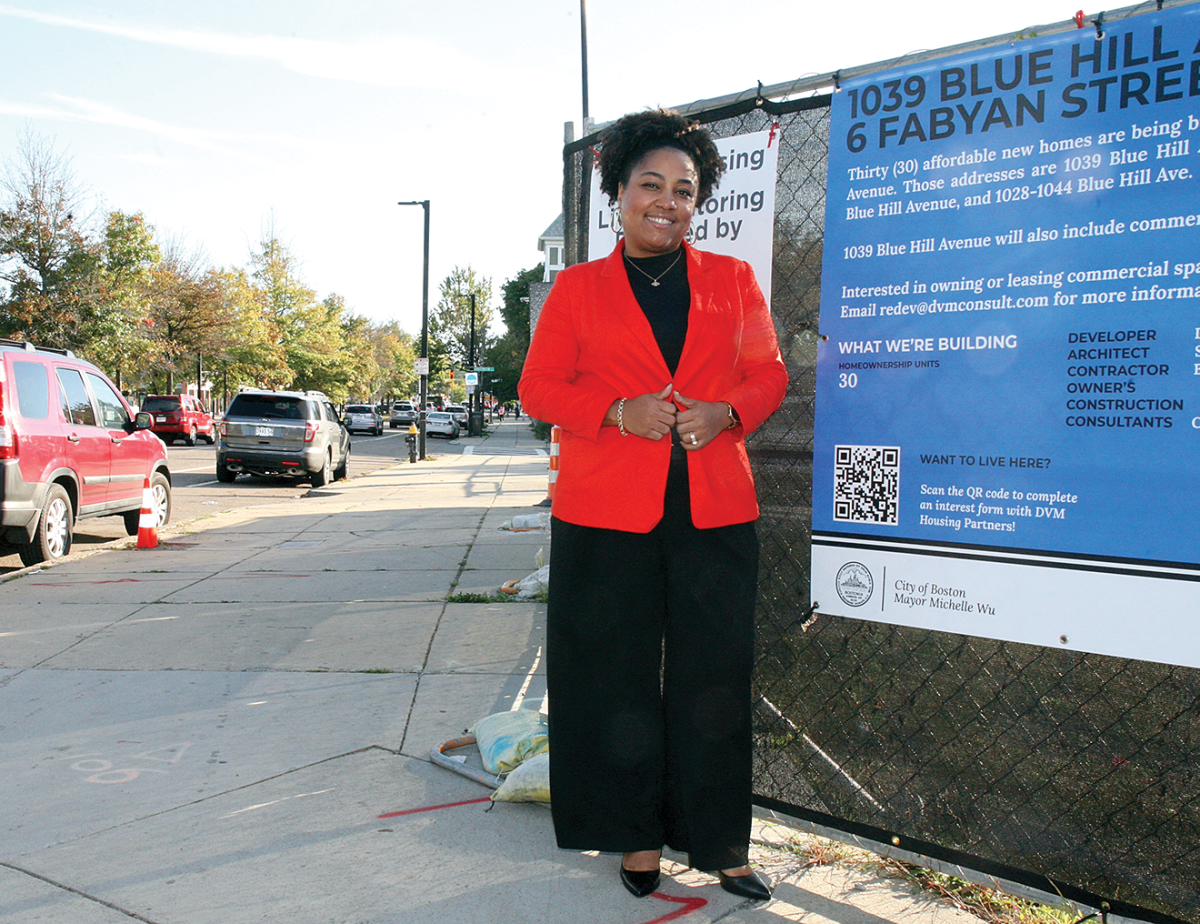
Dariela Villon-Maga, top right, is developing three long-vacant city lots in the 1000th block of Blue Hill Avenue, having broken ground just three months ago.
“I think these folks are starting to find others to lean on and get help from,” she added. “The difference here is these same folks are now able to maintain ownership of properties and upgrade them instead of getting desperate and selling them fast in the speculative market.”
Villon-Maga, who grew up in Grove Hall, secured the development rights to build 30 units of affordable homes on three vacant lots in the 1000 block of Blue Hill Avenue just south of Talbot Avenue through a city-run bidding process that began in 2021.
Since then, she has been ramping up to build the housing along with three ground-floor commercial spaces in a complex that she’s dubbed “Blume on the Ave.”
“One fear we had when we responded to the Request for Proposals (RFP) was there wasn’t much interest in these four or five blocks, and the fear was as soon as one thing popped up, other real estate investors would search it out and it would begin to gentrify,” she said. “But everyone is seeing folks that look like them investing in property and keeping their property and improving it. I’m happy to have a piece of that.”
Across the street from Villon-Maga’s development are five new storefronts owned by Alex Pierpont of Riva Management. He purchased the building at 1070 Blue Hill from a church that closed a few years later. For several years now, he has been building out the retail spaces on spec and scouting for tenants.
“I’m getting so many calls from people interested in all sorts of things,” Pierpont said. “Most callers, though, have wanted to open convenience stores or salons…It’s been an interesting ride. I just love the energy of Blue Hill Avenue and all the diversity of people there. It really is an amazing place.”
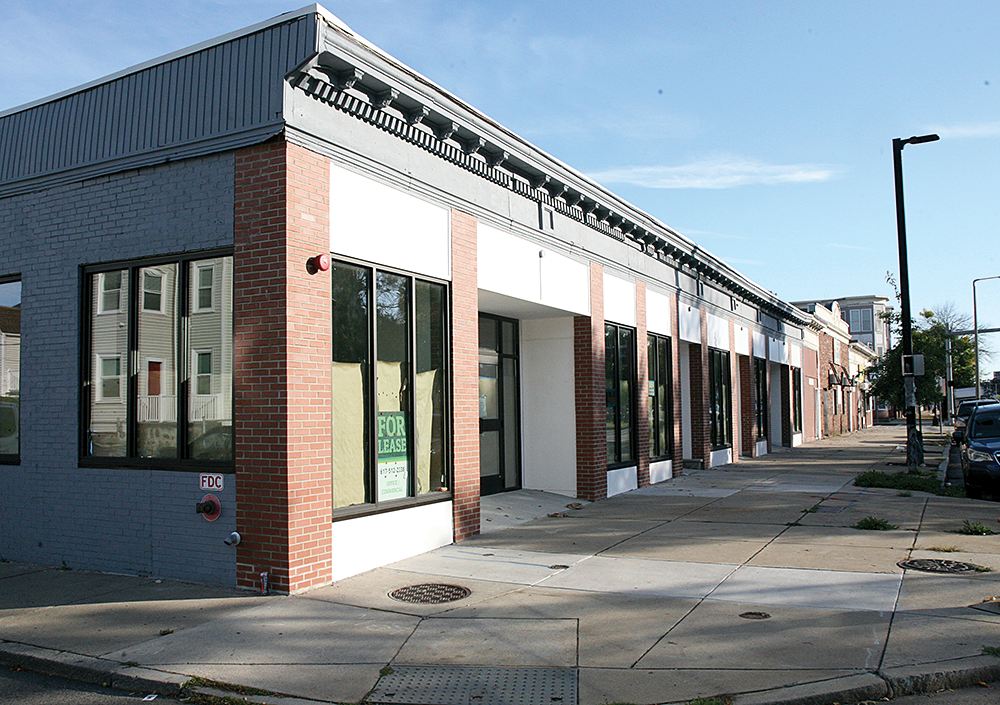
A strip of five new storefronts has emerged in the last few years as Alex Pierpont of Riva Management built out the stores as a labor of love. He said he loves the energy on Blue Hill and is getting lots of inquiries.
Pierpont hopes to lease to non-profits, maybe a law office or a barber shop. He would love to see a stand-alone bank ATM, he said.
This section of Blue Hill Avenue is both a commuter highway and a bustling business district with the B-3 police station anchoring the corner at Morton Street. State Rep. Russell Holmes, who lives within walking distance on Wellington Hill, said a state public works project completed in 2023 delivered $3 million in improvements here— newly paved streets, sidewalks, and improved crossings for pedestrians and transit riders.
“I believe the role of government is in many ways to prime the pump for private development,” said Holmes. “I don’t think public dollars can do it all…It’s a destination and we want destinations. We have accomplished what I hoped with state investments, and it’s just the beginning.”
Holmes points to a new Citizens Bank branch at the Morton-Blue Hill crossroads as a prime example. Last year, the bank relocated from Codman Square and converted what had been a long-abandoned and blighted Kentucky Fried Chicken location into a sleek new banking space. Citizens Massachusetts President Lisa Murray said the location had become “one of the fastest growing branches in the region since opening in Fall 2023.”
The resurgence in this area is not just about new businesses, however. Across the street from the bank branch is Chez Vous roller rink on Rhodes Street. Owned by the Toney family since the 1990s, it has been in operation since the 1930s.

Two Chez Vous customers pose at the rink on Family Day. The roller rink has been at the corner since the 1930s, and has seen a surge in local and outside customers, but owners worry about locals getting pushed out.
Forced to close for months during the pandemic, co-owners Derick Foster-Toney and Edward Toney, Jr., used the time to upgrade the floor, improve their menu, and shine up the rink overall. By 2022, those who have known Chez Vous their entire lives returned alongside a new customer base of young people willing to travel to the corner from outside of the community.
“The changes can be positive; it’s all about the approach,” said Foster-Toney. “We have a very distinct privilege of being in our community so long and we can grow and invest in our facility, and we are very diversified in who comes to do business with us.
“We have definitely seen an increase in diverse groups of clienteles and the change in the community to where more people are willing to come spend money with us in Dorchester, and that didn’t happen always because we weren’t a desired town to some,” he noted.”
“I want Dorchester to stay true to the folks who have been around,” he said. “It shouldn’t be an extension of downtown where nothing is local and there isn’t a community feel anywhere. The people here built this brick by brick and we can’t have it where suddenly you don’t recognize where you are. By then, it’s too late.”
That dynamic is a concern for Cleon Byron, a long-time Blue Hill Avenue property owner who owns the building occupied by the Family Hardware store, once home to the renowned G&G Deli, a landmark in the Jewish-American community that was anchored here for generations. The block was once a political destination for presidents and other electoral dignitaries, along with Holocaust survivors who used the popular deli as a weekly meeting point after arriving as refugees from World War II.
Byron is optimistic about the area but has been frustrated by regulations that he says are holding him back. His family operates a day care facility, and there’s also a restaurant on the block, but his plan to open a cannabis dispensary is on hold. Instead, Byron has built out a function hall at 1102 Blue Hill Ave. but says he cannot get city approval to open.
“I wish I could be a full participant in the change starting to happen around me,” he said, noting that he has held abutters meetings and hosted numerous walk-throughs of the space. “I feel the city is doing things to make me quit and give up…I want my Byron name to be out there and be a part of this change. The way it’s going, I feel they would rather we sell the building.”
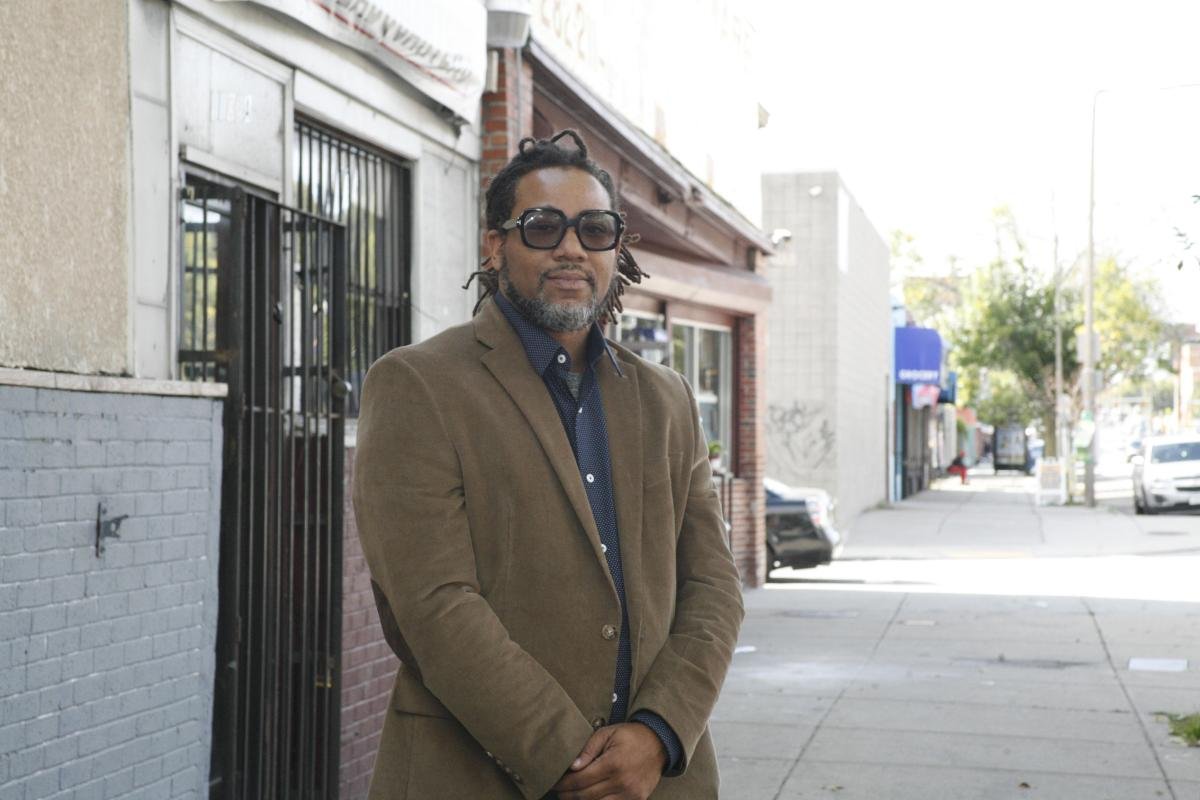
Cleon Byron, whose family has owned property on Blue Hill Avenue for decades, said he wishes he could participate in the changes. His plans for a much-needed function hall have been stymied by City Hall red tape, he says, and in response he’s calling for a merchant’s association for the corridor.
On the other side of the Morton St. divide, there’s new activity and new tenants in the former Lenny’s Tropical Bakery, which was a staple in the Caribbean community – known for beef patties and coco bread – for 40 years until it closed in 2020.
The renovated building is now home to a supermarket on the ground level run by Mohammed Odin. Upstairs, newly converted office space is the headquarters of SPARK FM, an online radio station that celebrated its new space with a ribbon cutting event on Oct. 5.
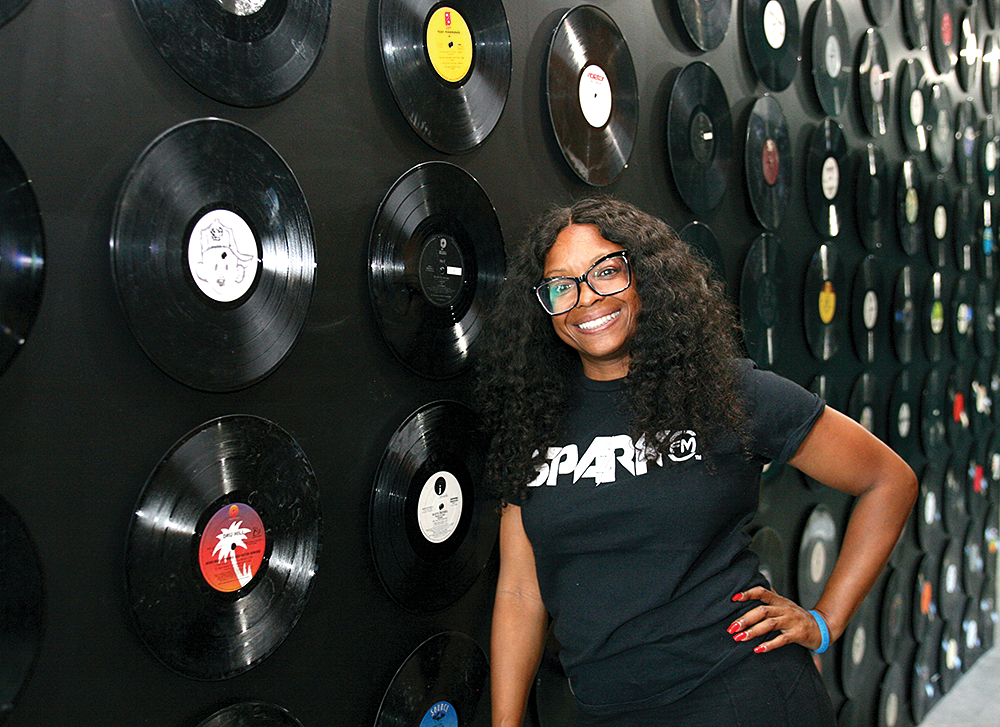
Danielle ‘Ms. Hot Sauce’ Johnson has moved SPARK FM to a brand new studio and community space in the old Lenny’s Tropical Bakery building. 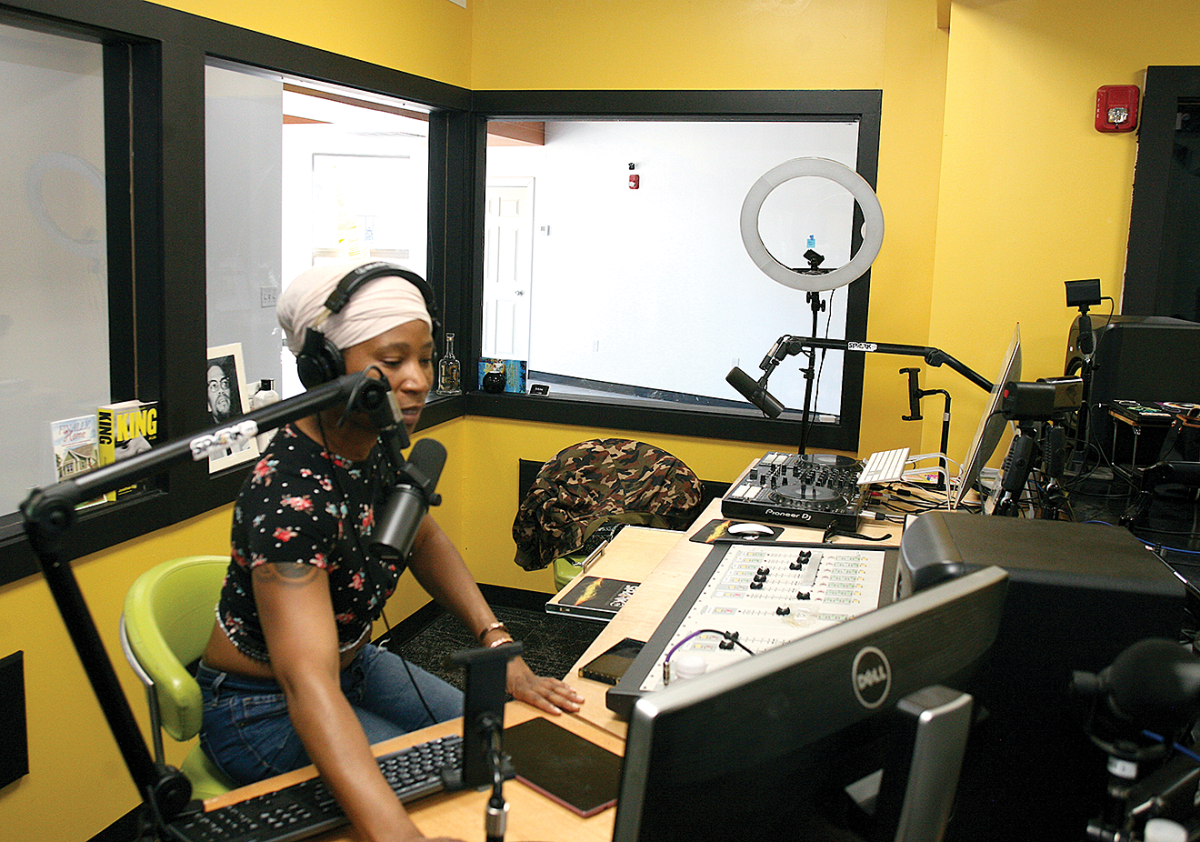
SPARK FM relocated from Hyde Park to the corner of Blue Hill and Morton in April, with a grand opening on Oct. 5. Here, longtime host ‘Pam Pam’ in the new studio broadcasting ‘Feel Good Fridays.’
The station’s owner, Danielle ‘Ms. Hot Sauce’ Johnson, moved here from a small space in Hyde Park that had been her base since the station launched in 2020. The 41-year-old Johnson said they were hoping for a new home in Nubian Square or Mattapan Square, but happily ended up halfway between.
Her station specializes in broadcasting to urban neighborhoods with 25 live shows per week, including a Sunday gospel show hosted by state Rep. Chris Worrell, her own morning show ‘Saucy and Friends,’ the ‘Feel Good Friday’ show with Pam Pam, and popular neighborhood personalities like DJ Whysham.
“The location was so important to us, Blue Hill Avenue being a major corridor in Boston and all these things happening on Blue Hill Avenue,” said Johnson. “We thought it would be a good place to be right in the center of all the communities we serve. It’s a vibe people can come in and say now we have a radio station on the middle of Blue Hill Avenue.”
The new state-of-the-art studio will also have podcasting and music production space for the public, using a membership system, and the large front lobby will double as an artsy function space.
Momentum like this has always been tempered with hesitation for long-time residents of Dorchester and Mattapan who fear displacement is an inevitable part of the deal. But Johnson is feeling upbeat about the present and the future.
“If we make it pretty first, then others from outside won’t feel like they have to come in here and do it for us. Let’s gentrify ourselves,” she said.
The owner of the building, Patrick Target of Norfolk Capital, bought Lenny’s with the idea of investing in the community born at a Future of Mattapan seminar that he attended with City Council President Ruthzee Louijeune.
“It’s great because when I grew up in Mattapan, the neighborhood businesses were hair stores, liquor stores, and bodegas,” he said. “Now I can see SPARK FM here and other changes. It feels good to be part of the change in the community…To strengthen the community we need to maintain ownership in the community and bring good businesses to the community and grow the community for the younger generation to be inspired by where they live.”
That mindset has been contagious.
Other changes have been smaller but notable, such as a new façade by Studio24 Graphix, a new look for Kay’s Oasis nightclub, the expansion of Roslindale’s popular La Taqueria to Blue Hill Avenue, and several other new storefronts and existing upgrades – including an updated interior and exterior for the Bon Appetite Restaurant, one of the oldest Haitian restaurants in Boston and one of the few eateries with a liquor license on Blue Hill Avenue.
A new state law authorizing some 225 new liquor licenses in Boston’s neighborhoods is adding more excitement for people and businesses along the corridor. Foster-Toney of Chez Vous plans to seek one, noting that they already do one-day licenses for parties, but they would find it easier for their customers to simply have an in-house license.
Nearby, Café Juice Up is considering applying for a liquor permit and is exploring partnerships, having just completed a pop up with ZAZ Café of Hyde Park.
Also interested in the opportunity is Blue Mountain Jamaican Restaurant, which will be opening next month on the ground-floor of a newly built apartment building near Ormand Street.
Blue Mountain Jamaican Restaurant will open next month in a new retail space on Blue Hill Avenue in the newly-constructed building. The restaurant owner said her operations were displaced from Morton Village late last year, and she’s excited by the energy in her new area of Blue Hill Avenue.
Blue Mountain’s owner, Marcia Satchell, originally opened in 2019 in Morton Village, but she has been displaced by a cannabis operator. She’s excited by the promise of the new and bigger location and also hopes to secure a liquor license.
“This location provides more visibility and it’s a community feel and has more foot traffic,” she said, noting vegetarian and vegan options are part of their menu. “At this location we’re going to have something for everyone…We are excited, and our thing is we love the joy of seeing people eating. Seeing people enjoying what we do is joyous.”
Rep. Holmes noted one important difference between now and the past: A switch in appearance that he said is putting out the “welcome mat. The businesses are not putting in security grates and they have glass fronts that you can see through – the windows aren’t covered up and there’s professional lighting outside,” he said. “It becomes contagious – when one does it, so do the others. It says that you’re welcome here, something is happening, and it’s safe.”

